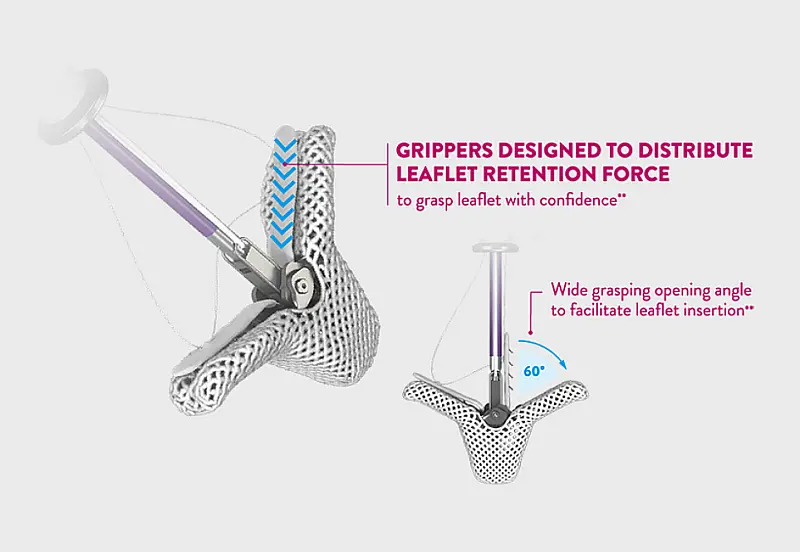Non-surgical treatment of mitral regurgitation with MitraClip™.
What is MitraClip™?
MitraClip™ is a straightforward method for addressing issues with your mitral valve.
In this procedure, physicians utilize a slender tube, known as a catheter, which is directed through a vein in your leg to access the mitral valve and reach your heart.
A small clip is implanted onto your mitral valve, aiding in achieving a more complete closure. This action contributes to the restoration of normal blood flow throughout your heart.
Transcatheter Edge-to-Edge Repair with MitraClip™ G4
A leaky heart valve can diminish your quality of life. While some individuals with a leaky valve (mitral regurgitation) may not initially exhibit symptoms of heart failure, over time, the condition can deteriorate as the heart struggles to pump sufficient blood to meet the body's demands. It is crucial to identify and discuss the signs of heart failure with your doctor.
Your physician might label it as transcatheter mitral valve repair (TMVr) or describe it as minimally invasive, a departure from traditional surgery. Unlike conventional surgical methods, the MitraClip™ procedure doesn't involve opening the chest or temporarily halting the heart.
As evident, it's smaller than a dime, facilitating its placement through a catheter-based procedure.
Following the procedure, many patients typically notice enhancements in symptoms related to their leaky valve and an overall improvement in their quality of life.
It's a well-established therapy. On average, this minimally invasive procedure typically lasts only 1-3 hours. Additionally, the majority of patients are able to return home within 1-3 days. After undergoing this swift procedure, individuals have shown reduced mortality risk, fewer hospitalizations, and a notable improvement in well-being compared to relying solely on medication.
FACTS
- A leaky valve, technically known as mitral regurgitation, is a prevalent condition primarily affecting one of the most common valves in the heart—the mitral valve. Approximately 1 in 10 individuals aged 75 and older experience moderate or severe mitral regurgitation. To ascertain the presence of mitral regurgitation and evaluate the function and condition of your heart and mitral valve, your cardiologist may conduct diagnostic assessments, including:
- ○ Performing a chest x-ray and/or ultrasound to examine the size and shape of your heart and assess your lungs
- ○ Checking for symptoms of congestive heart failure (such as shortness of breath or fatigue) or other associated heart conditions
-
MitraClip™ is composed of a small metal clip enveloped in polyester fabric, and it is surgically implanted on the mitral valve. The insertion of the clip is achieved through a catheter, eliminating the necessity to temporarily halt the heart. The procedure allows for the utilization of up to four different clip sizes, ensuring a tailored fit to your valve.
- The
MitraClip™ procedure has demonstrated significant benefits, with over 150,000 patients treated globally and more than 30,000 individuals tracked through various studies and registries. The outcomes include:
- ○ LIFE-SAVING: A 33% reduction in the relative risk of mortality.
- ○ FEWER HOSPITALIZATIONS: A 51% relative risk reduction in heart failure-related hospitalizations.
- ○ IMPROVED QUALITY OF LIFE: Patients are 2.5 times more likely to experience a substantial improvement in their quality of life.
- Moreover, the MitraClip™ procedure is proven to be safe with the following attributes:
- ○ MINIMALLY INVASIVE: The procedure doesn't necessitate chest opening or temporarily stopping the heart.
- ○ SWIFT PROCEDURE: Typically lasting 1 to 3 hours.
- ○ BRIEF HOSPITAL STAY: Patients are generally discharged within 1 to 3 days, significantly shorter than traditional surgery recovery times.
Even five years after the MitraClip™ procedure, patients continued to demonstrate improvement in heart function, quality of life, and the ability to carry out daily tasks.
REPAIR YOUR LEAKING HEART VALVE. RECLAIM YOUR LIFE.
Think heart-related problems are just something you have to live with? Think again.




